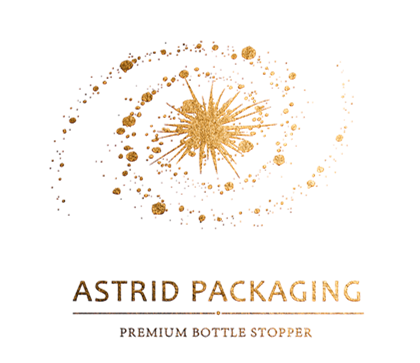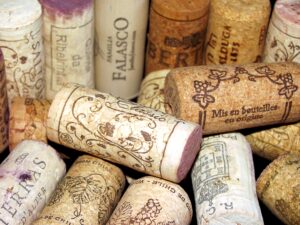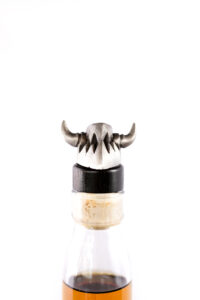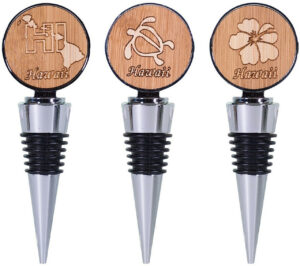Introducción
Definition of bulk wine stoppers
Bulk wine stoppers, also known as wine closures, are the devices used to seal wine bottles and preserve the quality and freshness of the wine. These stoppers are specifically designed for wines that are packaged and sold in large quantities, such as in barrels or tanks. The primary function of bulk wine stoppers is to prevent oxygen from entering the bottle, which can cause the wine to oxidize and deteriorate. They are typically made from materials like cork, synthetic materials, or a combination of both. Over the years, the design and materials used for bulk wine stoppers have evolved, with advancements in technology and the growing demand for more sustainable options. Today, there are various types of bulk wine stoppers available in the market, each offering different benefits and characteristics to cater to the diverse needs of winemakers and consumers.
Importance of bulk wine stoppers
Bulk wine stoppers play a crucial role in the winemaking process, ensuring the quality and longevity of the wine. These stoppers are specifically designed to seal wine bottles in large quantities, allowing wineries to store and transport their products efficiently. The importance of bulk wine stoppers lies in their ability to preserve the flavors, aromas, and overall characteristics of the wine by preventing oxidation and contamination. Without proper stoppers, wine can be exposed to air, leading to spoilage and loss of quality. Additionally, bulk wine stoppers also contribute to sustainability efforts, as they reduce the need for individual packaging materials. Overall, the use of high-quality bulk wine stoppers is essential for winemakers to maintain the integrity of their products and ensure customer satisfaction.
Resumen del artículo
In this article, we will explore the fascinating history and evolution of bulk wine stoppers. Wine stoppers play a crucial role in preserving the quality and flavor of wine, and their development over time has been driven by the need for efficient and effective sealing methods. From ancient civilizations using natural materials like cork and wax to modern innovations such as synthetic corks and screw caps, the evolution of bulk wine stoppers reflects advancements in technology and changing consumer preferences. Join us as we delve into the rich history and discover the various types of wine stoppers used throughout the ages.
Early Wine Stoppers

Ancient wine stoppers
Ancient wine stoppers have a long and fascinating history that dates back thousands of years. In ancient civilizations such as Egypt, Greece, and Rome, various materials were used to seal wine containers and prevent oxidation. One popular type of stopper was made from clay or ceramic, often shaped like a cone or a disk. These stoppers were effective in keeping the wine fresh and preserving its flavors. Another common material used for wine stoppers was cork, which was harvested from the bark of cork oak trees. The use of cork stoppers became more widespread during the Roman era and continued to be popular throughout history. The development of ancient wine stoppers marked an important milestone in the evolution of wine preservation techniques, laying the foundation for the innovations that would follow in later centuries.
Cork as a popular stopper material
Cork has been a popular stopper material for centuries, known for its unique properties and ability to effectively seal wine bottles. The use of cork as a wine stopper can be traced back to ancient times, with evidence of its use dating back to ancient Egypt and Greece. The popularity of cork as a stopper material grew during the Middle Ages, as wine production and consumption increased across Europe. Cork’s natural elasticity and impermeability make it an ideal choice for preserving the quality and flavor of wine, as it prevents oxygen from entering the bottle and causing spoilage. Over the years, the production and use of cork stoppers have evolved, with advancements in technology and alternative materials. However, cork remains a beloved and widely used stopper material, valued for its traditional appeal and contribution to the aging process of wines.
Challenges with early wine stoppers
Challenges with early wine stoppers were a significant hurdle for winemakers throughout history. The use of natural materials such as cork, wood, and glass stoppers presented various issues. Cork stoppers, for example, were prone to leakage, leading to spoilage and loss of wine. Wood stoppers were not airtight and allowed oxygen to enter the bottle, causing oxidation. Glass stoppers, although more durable, were difficult to insert and remove, making them impractical for everyday use. These challenges prompted the search for alternative solutions to preserve wine effectively.
The Rise of Synthetic Stoppers

Introduction of synthetic stoppers
Synthetic stoppers have revolutionized the wine industry with their innovative design and functionality. Unlike traditional cork stoppers, synthetic stoppers are made from materials such as plastic or rubber, ensuring a consistent and reliable seal. This has significantly reduced the risk of wine spoilage due to cork taint, a common issue with natural cork stoppers. Additionally, synthetic stoppers are more cost-effective and sustainable, as they can be easily recycled. As a result, many wineries have embraced the use of synthetic stoppers, providing a reliable and convenient alternative to traditional cork stoppers.
Advantages and disadvantages of synthetic stoppers
Synthetic stoppers have gained popularity in recent years due to their numerous advantages. One of the main advantages of synthetic stoppers is their consistency in quality and performance. Unlike natural cork stoppers, synthetic stoppers are not prone to cork taint, which can affect the aroma and taste of the wine. Additionally, synthetic stoppers provide a more reliable and consistent seal, reducing the risk of leakage and oxidation. Another advantage is that synthetic stoppers are less expensive than natural cork stoppers, making them a cost-effective option for wineries. However, synthetic stoppers also have some disadvantages. One of the main drawbacks is that they do not allow for the same level of oxygen exchange as natural cork stoppers, which can impact the aging process of the wine. Additionally, some wine enthusiasts argue that synthetic stoppers lack the traditional and romantic appeal of natural cork. Despite these disadvantages, synthetic stoppers have proven to be a viable alternative for sealing bulk wines, providing winemakers with a reliable and cost-effective option.
Impact on the wine industry
The impact of bulk wine stoppers on the wine industry has been significant. With the introduction of bulk wine stoppers, wineries have been able to streamline their production processes and reduce costs. This has allowed for greater accessibility to quality wines at more affordable prices. Additionally, bulk wine stoppers have also played a role in reducing the environmental footprint of the wine industry. By using reusable stoppers instead of traditional single-use corks, wineries are contributing to sustainability efforts and minimizing waste. Overall, the adoption of bulk wine stoppers has revolutionized the wine industry, making it more efficient, cost-effective, and environmentally friendly.
The Cork Controversy

Environmental concerns with cork production
Environmental concerns with cork production have become a significant issue in recent years. Cork production relies on the extraction of bark from cork oak trees, which can have a negative impact on the trees and their surrounding ecosystems. Additionally, the process of cork production requires a significant amount of water and energy, contributing to environmental degradation. As a result, there has been a growing interest in alternative wine stoppers that are more sustainable and eco-friendly. These alternatives include synthetic corks, screw caps, and glass stoppers, which offer comparable sealing properties while reducing the environmental footprint of the wine industry.
Alternatives to cork stoppers
There are several alternatives to cork stoppers in the wine industry. One popular alternative is the screw cap, which has gained popularity in recent years. Screw caps provide an airtight seal, preventing any oxygen from entering the bottle and ensuring the wine remains fresh. Another alternative is the synthetic cork, which is made from materials like plastic or rubber. Synthetic corks are less prone to cork taint and are more consistent in their sealing ability. Additionally, glass stoppers have also emerged as an alternative to cork. These stoppers provide an elegant and reusable option for sealing wine bottles. Overall, the availability of these alternatives has provided winemakers with more options when it comes to choosing the best stopper for their wines.
Consumer perception and preference
Consumer perception and preference play a crucial role in the success of any product, and the bulk wine stoppers industry is no exception. As consumers become more conscious of environmental sustainability and the impact of their choices, the demand for eco-friendly wine stoppers has been on the rise. Many consumers now favor stoppers made from renewable materials such as cork or recycled materials, as they are seen as more sustainable alternatives to traditional plastic or metal stoppers. Additionally, consumers also value the aesthetics and functionality of wine stoppers. They appreciate stoppers that not only effectively preserve the quality and flavor of the wine but also add a touch of elegance to the overall wine-drinking experience. Understanding consumer perception and preference is essential for bulk wine stopper manufacturers to meet the evolving demands of the market and stay competitive.
Innovations in Bulk Wine Stoppers
Screw caps as an alternative
Screw caps have emerged as a popular alternative to traditional wine stoppers in recent years. While cork has long been the go-to choice for sealing wine bottles, screw caps offer several advantages. Firstly, screw caps provide a more reliable seal, ensuring that the wine remains fresh and free from oxidation. This is particularly important for bulk wine, as it allows producers to maintain the quality and consistency of their products. Additionally, screw caps are easier to open and reseal, making them more convenient for both producers and consumers. Furthermore, screw caps eliminate the risk of cork taint, a common issue associated with traditional cork stoppers. Overall, screw caps have revolutionized the wine industry by providing a practical and effective alternative to bulk wine stoppers.
Glass stoppers for premium wines
Glass stoppers for premium wines have a long and fascinating history. Dating back to ancient times, glass stoppers were used to seal bottles of the finest wines, ensuring their quality and longevity. These stoppers were often intricately designed, showcasing the craftsmanship and attention to detail of the artisans who created them. Over the centuries, glass stoppers have evolved in both design and function, adapting to the changing needs of the wine industry. Today, glass stoppers are still highly regarded for their ability to preserve the delicate flavors and aromas of premium wines, making them a popular choice among wine enthusiasts and collectors. Whether it’s a vintage Bordeaux or a rare Burgundy, the use of glass stoppers adds a touch of elegance and sophistication to the wine experience.
Other emerging stopper technologies
Other emerging stopper technologies are gaining popularity in the wine industry. One such technology is the use of glass stoppers, which provide an elegant and sustainable alternative to traditional cork stoppers. Glass stoppers not only preserve the quality and taste of the wine but also add a touch of sophistication to the overall presentation. Another emerging stopper technology is the use of synthetic stoppers, which are made from materials such as plastic or rubber. These stoppers offer a reliable seal and are less susceptible to cork taint, ensuring that the wine remains untainted and enjoyable. Additionally, screw caps have been gaining traction as a convenient and cost-effective stopper option. While traditionally associated with lower-quality wines, screw caps are now being embraced by winemakers for their ability to preserve the freshness and aging potential of certain wines. As the wine industry continues to evolve, it is exciting to see the development and adoption of these innovative stopper technologies.
Future Trends
Exploring sustainable stopper options
Exploring sustainable stopper options is crucial in the wine industry as it strives to reduce its environmental impact. With the growing concern for sustainability, winemakers are increasingly looking for alternatives to traditional stoppers like cork and plastic. One option gaining popularity is the use of natural or synthetic cork alternatives, such as glass or aluminum closures. These alternatives not only provide a sustainable option but also ensure the quality and longevity of the wine. Additionally, some wineries are experimenting with innovative stoppers made from renewable materials like plant-based polymers or biodegradable plastics. By exploring these sustainable stopper options, the wine industry can contribute to a greener future while maintaining the integrity of their products.
Advancements in closure technology
Advancements in closure technology have greatly influenced the history and evolution of bulk wine stoppers. Over the years, there have been significant developments in the types of closures used to seal wine bottles, ensuring the quality and longevity of the wine. Traditional cork stoppers, made from the bark of the cork oak tree, have been widely used for centuries. However, with the introduction of synthetic closures, such as plastic and screw caps, winemakers have been able to address issues like cork taint and inconsistent sealing. These advancements have revolutionized the wine industry, allowing for more efficient production, improved preservation, and enhanced consumer experience. Today, winemakers have a range of options to choose from when it comes to bulk wine stoppers, each with its own advantages and considerations.
Predictions for the future of bulk wine stoppers
Predictions for the future of bulk wine stoppers: With the increasing demand for sustainable and eco-friendly packaging solutions, it is expected that the use of bulk wine stoppers will continue to grow in the coming years. As consumers become more conscious about the environmental impact of their choices, wineries and wine producers are exploring alternatives to traditional cork stoppers. Bulk wine stoppers, such as synthetic corks and screw caps, offer advantages like consistent quality, reduced risk of cork taint, and cost-effectiveness. Additionally, advancements in technology and materials are likely to lead to the development of even more innovative and efficient bulk wine stoppers. Overall, the future looks promising for bulk wine stoppers as they provide a practical and sustainable solution for the wine industry.





